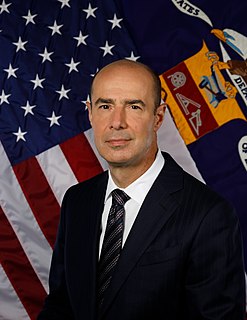A Quote by Kapil Sibal
The overreach of the judiciary can be attributed to, one, the inability of the executive to deliver; and two, the tendency to issue judicial pronouncements for national good. The second element is dangerous because that's the function of the government.
Related Quotes
By Congress delegating its authority to the executive and judicial branches, we've removed the American people from the process. They're left as bystanders to the whims of executive overreach, and they're watching the country they know and love slip away. Worse, they think their representatives are powerless to stop it.
There could be constitutional problems with executive detention if it is seen to be arbitrary. I didn't actually say that the NSW Government's proposed anti-terrorism bill was necessarily unconstitutional - that was sloppy journalism - I said that executive detention may raise constitutional problems if it is seen to be arbitrary as being an invasion of the judicial function.
Just as judges have enormous stake in the appointment of judicial officers in the higher judiciary, the government has an equal stake. Since both of us have stakes in the appointment of members of the higher judiciary, the consultation of both of them is absolutely necessary. The government must have a say.
The constitution has divided the powers of government into three branches, Legislative, Executive and Judiciary, lodging each with a distinct magistracy. The Legislative it has given completely to the Senate and House of Representatives. It has declared that the Executive powers shall be vested in the President, submitting special articles of it to a negative by the Senate, and it has vested the Judiciary power in the courts of justice, with certain exceptions also in favor of the Senate.
Power is the great evil with which we are contending. We have divided power between three branches of government and erected checks and balances to prevent abuse of power. However, where is the check on the power of the judiciary? If we fail to check the power of the judiciary, I predict that we will eventually live under judicial tyranny.
Marriage is not defined in the federal Constitution at all; it's a matter for the states. And applying the Fourteenth Amendment to the equality of men and women and their relationship in marriage is totally different than redefining marriage. Here is the overreach of the judiciary. This, if allowed to stand without any congressional approval, without any kind of enabling legislation, is what Jefferson warned us about. That's judicial tyranny.
If we are to avoid that catastrophe [a nuclear World War III], a system of world order — preferably a system of world government — is mandatory. The proud nations someday will see the light and, for the common good and their own survival, yield up their precious sovereignty, just as America's thirteen colonies did two centuries ago. When we finally come to our senses and establish a world executive and parliament of nations, thanks to the Nuremburg precedent we will already have in place the fundamentals for the third branch of government, the judiciary.































